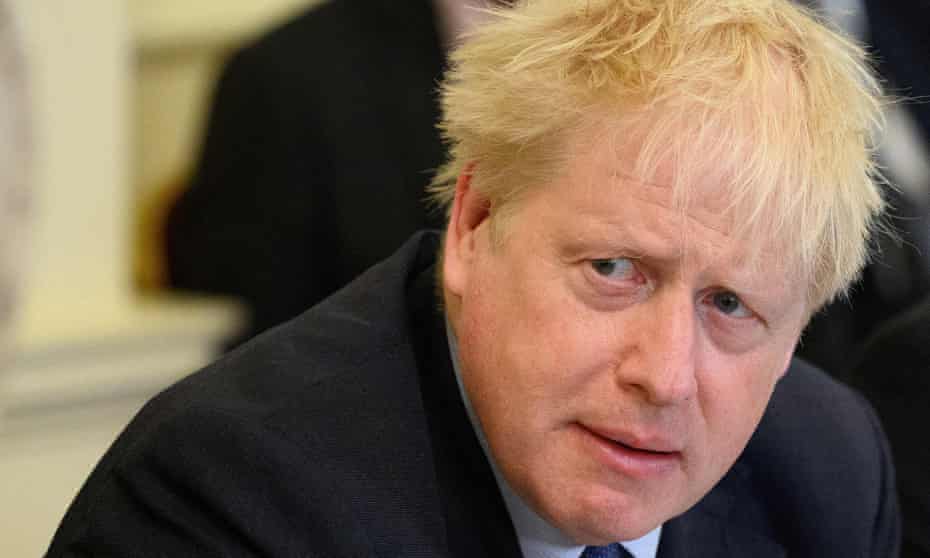No one really believes this confidence vote was a victory for the prime minister. His rivals are circling, and the rebels won’t give up

When Theresa May faced her confidence vote, her supporters hit the phones relentlessly to try to win round waverers. They positioned themselves in corridors to nobble the unsuspecting. They made sure no Tory could buy their lunch without having the case for May made to them. But there was an odd calm in the Commons on Monday. One loyal minister was patrolling the colonnade, but other than that there was little activity from leadership loyalists.
The message Johnson’s team were trying to convey was that it was business as usual. There was no reason to panic. Only an hour before the vote, nerves began to set in among members of Johnson’s inner circle. A chunk of ministers still hadn’t come out publicly to support him. Meanwhile, members of the 2019 intake weren’t picking up their phones.
When the result was announced, it was worse than they had imagined. With 148 rebels voting against, Johnson has fared worse than May did. “It’s shocking,” a former government colleague of Johnson’s says of the result. A Tory MP adds: “They became complacent.”
Critics point the finger of blame at a reduced operation. Earlier this year, Johnson’s shadow whipping team – made up of longstanding allies such as Nigel Adams and Chris Pincher – succeeded in shoring up support for the prime minister. But in recent weeks, it has been notably lo-fi. “It’s bizarre,” says a senior government figure. “It’s like they felt the problem had been dealt with.”
Now it’s too late. The prime minister is engaged in a fight for survival.
Although ministers were quick to get out and herald it as a victory – with the education secretary, Nadhim Zahawi, describing it as a handsome margin – no one really believes that. Ministers are also sceptical of the idea that it will in any way draw a line under Johnson’s troubles. “It’s a very narrow win,” admits a member of government. “It doesn’t bring the matter to a close. It marks the next stage of destabilisation.”
Johnson may technically be safe for another 12 months but there are already whispers that the rules could be changed – and it wouldn’t take long to do that.
Even if he does manage to dig in and lead the party into the next election, governing is going to become much harder. While one MP wrote on the Tory WhatsApp group on Tuesday morning pleading for unity, it is not where many of their colleagues are. “We now have a situation where a lot of MPs have come out of the woodwork to criticise him publicly,” says a senior Conservative. “It’s very hard to get people back on side once they are publicly against you.” Some have gone so far to say that it is hard to see how they could stand as Tory candidates at the next election if Johnson was leader.
Given the rebels won’t give up, Johnson will be regularly under attack.
Talk of a reshuffle to improve his fortunes appears rather bold given they tend to make you more enemies than friends. Johnson faces a dilemma in any shake-up. MPs who backed Johnson believe there are ministers who were not suitably loyal – such as Penny Mordaunt who declined to tell her local paper how she would vote. There are calls for these ministers to be sacked and replaced with those who have shown support.
“He needs to pick a side of the party to win over and stick to it,” says a former minister. “He has to cut taxes win back the right – even if that means losing his chancellor.”
But if Johnson were to do any of the above, it could cause more of a problem for him on the backbenches.
The byelection results later this month are likely to turn more MPs into rebels. Yet few expect the rebels to manage another confidence vote in the coming weeks. It’s why it’s actually the privileges committee that is now viewed as the most dangerous to Johnson. Should the committee find that he did mislead the Commons and say he should be suspended, it could go to a Commons vote. At that point the fact that 40% of your party are against you matters a great deal.
Little wonder then that leadership talk is once again abuzz. The former health secretary Jeremy Hunt went the furthest on Monday – announcing that he would vote against Johnson and it was time for change. However, he didn’t go quite so far as to say he was running. Despite this, his comments have led to a backlash over disloyalty. “Hunt is being blamed for causing the vote, whether right or wrong,” says one government adviser.
Given there are plenty of Johnson loyalists who would take against Hunt, he would face resistance in a leadership contest. Johnson’s bigger problem is his cabinet – who can use the next few months to organise so they are ready in the event everything falls. “The party conference is going to be one long leadership parade,” predicts a Tory MP: expect lots of speeches.
There are still some around the prime minister who remain bullish. They believe Johnson, having survived the confidence vote, can simply call an election in 2023 if another vote looks likely in a year’s time. “If he makes it past the autumn he could just start a year-long election campaign and put his face on all the leaflets,” predicts one Tory MP.
But the Conservative party has a way of ousting those who are no longer of use to it – and unless Johnson gets a grip, he will be one of them.
